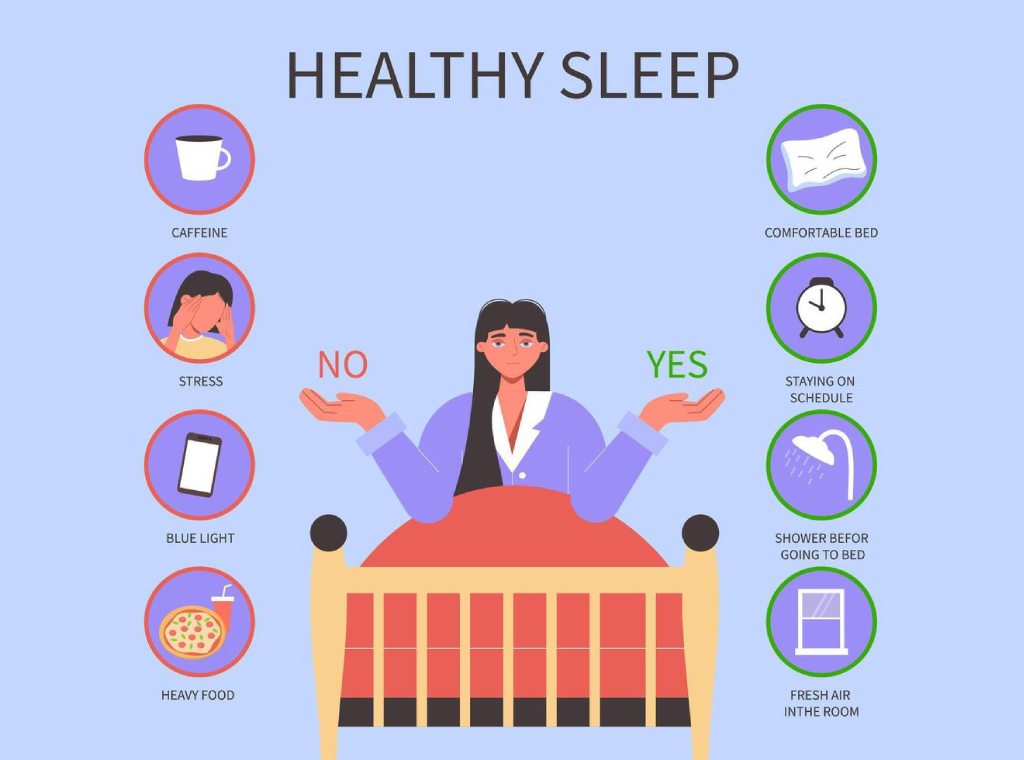It started with endless yawns at work…
Ramesh, a 35-year-old bank employee from Pune, couldn’t figure out why he was always tired. He went to bed at midnight, woke up at 6:30 am, and assumed that was enough. But every afternoon, the office felt like a battle against sleep, and no amount of chai could save him.
One day, a friend mentioned something that caught his attention — “It’s not just how much you sleep, it’s how you sleep.” That was the first time Ramesh heard about Sleep Hygiene Tips. Within weeks of making small changes, he felt more alert, less cranky, and healthier overall.
This is the power of good sleep hygiene — and it’s something most of us don’t pay attention to until fatigue starts affecting our mood, productivity, and even relationships.
Why your nights might be ruining your days
Most middle-class Indians juggle long working hours, family responsibilities, late-night mobile scrolling, and irregular eating habits. Sleep often takes the hit.
But here’s the thing — poor sleep isn’t just about tiredness. It can lead to weight gain, low immunity, irritability, and even long-term health problems like diabetes and heart disease.
The good news? You don’t have to wait for a health scare to make a change. Just follow these 10 simple and effective sleep hygiene tips.
1. Set a Consistent Sleep Schedule
Your body loves routine. Going to bed and waking up at the same time every day — even on weekends — trains your internal clock, making it easier to fall asleep and wake up refreshed.
Try this: Fix a bedtime and wake-up time that works for your lifestyle, and stick to it for at least 3 weeks. You’ll see the difference.
2. Create a Relaxing Bedtime Ritual
Instead of scrolling through reels or catching “just one more episode,” wind down with calming activities.
Ideas:
- Read a physical book (not on your phone)
- Listen to soft instrumental music
- Do light stretching or deep breathing
This tells your brain it’s time to slow down.
3. Limit Screen Time Before Bed
Blue light from phones, laptops, and TVs tricks your brain into thinking it’s still daytime.
Solution: Switch off screens at least 30–60 minutes before bed. If you must use your phone, enable “night mode” or blue light filters.
4. Keep Your Bedroom Cool, Dark, and Quiet
A good sleep environment makes a huge difference.
- Keep your room between 20–24°C
- Use blackout curtains or an eye mask
- Block out noise with earplugs or white noise apps
Your bedroom should feel like a sleep sanctuary, not a multipurpose hall.
5. Watch What You Eat and Drink
Heavy meals, caffeine, and sugary snacks close to bedtime can disturb your sleep.
Best practice:
- Avoid tea, coffee, and cola after 5 pm
- Have dinner at least 2–3 hours before bed
- Opt for light meals like khichdi, dal-chawal, or vegetable soup at night
6. Get Morning Sunlight
Stepping outside in the morning signals your body to reset its internal clock.
Try this: Spend 10–15 minutes in natural light soon after waking up — on your balcony, terrace, or even near a sunny window.
7. Stay Active During the Day
Regular physical activity improves sleep quality, but avoid intense workouts right before bedtime.
Best time: Early morning or evening (at least 2–3 hours before sleeping). Even a brisk walk after dinner helps.
8. Manage Stress Before Bed
Overthinking is the biggest enemy of sleep.
What works:
- Write down tomorrow’s to-do list before bed
- Practice gratitude journaling
- Try guided meditation or relaxation apps
9. Keep Naps Short
An afternoon nap can be refreshing, but long or late naps can make it harder to sleep at night. Limit naps to 20–30 minutes before 3 pm.
10. Make Your Bed Only for Sleep
Avoid working, eating, or binge-watching in bed. This trains your brain to associate your bed only with rest, making it easier to sleep.
Your takeaway from The Life TrackR
Good sleep isn’t a luxury — it’s a necessity. By following these Sleep Hygiene Tips, you’ll notice better mood, higher energy, and even improved focus at work. Start with 2–3 tips this week and build from there.
FAQs About Sleep Hygiene
1. How many hours of sleep do adults need?
Most adults need 7–9 hours of quality sleep every night.
2. Is it okay to sleep late if I get enough hours?
No. Irregular sleep times can disturb your body clock even if you sleep enough.
3. Does drinking warm milk before bed help?
Yes, for some people it promotes relaxation due to tryptophan content.
4. Can I catch up on lost sleep during weekends?
Occasionally, yes — but it’s better to maintain a consistent schedule.
5. Is using a fan or AC better for sleep?
Both work as long as the temperature is comfortable and there’s good ventilation.
6. Does exercising at night affect sleep?
Intense workouts close to bedtime can make it harder to sleep. Light stretching is fine.
7. Should I see a doctor for sleep problems?
If sleep issues persist for more than 2 weeks despite lifestyle changes, consult a doctor.
8. Can meditation really improve sleep?
Yes, meditation can calm the mind, reduce stress, and promote deeper sleep.
Conclusion
Better sleep isn’t about sleeping longer — it’s about sleeping smarter. By practicing these Sleep Hygiene Tips daily, you’ll transform your nights and energize your days. The Life TrackR believes that with small, consistent changes, every Indian can enjoy deep, refreshing rest without pills or expensive gadgets.
#TheLifeTrackR #SleepHygiene #BetterSleep #HealthyLivingIndia #SleepTipsIndia
Editor’s Note: This article was originally published here https://thelifetrackr.com/10-sleep-hygiene-tips-every-indian-should-know-for-better-rest/ by @Kairav and @krutika
